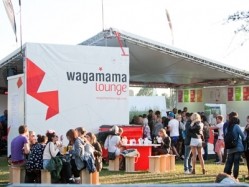Wagamama combines food, art and music in new festival format

After six months of planning, the first Wagamama Lounge was trialled at Manchester’s Park Life Weekender festival earlier this month, where it sold over 2,500 portions of noodles in two days.
If the brand’s second festival appearance at Leicester's Summer Weekender in August proves to be equally as successful, the concept could be rolled out to a further four to six events in 2012, followed by more growth the year after, said Wagamama director of marketing Ingrid Williamson.
Festival experience
Williamson and her team adapted the restaurant chain’s format to deliver a “memorable experience” to festival goers. It follows a three-tier structure: a counter-serve restaurant with open plan group seating; a digital interactive graffiti wall for customers to design; and a DJ booth.
“We decided to create Wagamama Lounge because the quality of food and its pricing at festivals is so often disappointing,” explained Williamson. “People talk about the memories they’ve had at festivals, and for brands to go to festivals they have to offer an experience, something of value, something that people will take away with them.
“As a brand, we have the ability to offer that experience and that memory. It was really important for us when we talked about festivals that we’d offer that, and not just turn up in a van. But also alongside that it was important to offer delicious food of the same quality that people are used to in our restaurants, but items that are easy and convenient to eat.”
Wagamama Lounge format
As a first phase, Wagamama Lounge is offering only four noodles dishes, all of which are prepared fresh to order in an open plan kitchen. Unlike the restaurants, customers need to order their food at the counter. Seating is provided – “quite a luxury for festivals” – but remains very open plan to match the festival atmosphere.
The prices are “more or less” the same as the chain’s high street outlets, although have been rounded up or down as items can only generally be sold in denominations of 50p and £1.
“It was important for us to offer as close an experience to our restaurants as possible. We don’t want to rip off the customers,” said Williamson. “The portions are also the same size as in our restaurants, but the menu is smaller; it was all about understanding how customers behave at festivals and what they’re likely to do.”
Wagamama Lounge also aims to provide its customers with entertainment as well as food. The digital graffiti wall allows people to create their own designs, while the DJ booth adds music into the mix.
All DJs are Wagamama staff who had submitted their own playlists as part of an employee engagement programme. “The biggest asset to working on any business is the staff and this has created a huge buzz amongst our staff, everyone’s really excited and motivated and that in itself speaks volumes,” said Williamson.
Adapting to the times
It is still early days to decide upon the long-term adoption of the Wagamama Lounge model, but the company has committed to an initial three-year strategy, which it then hopes to expand, she explained.
“We got a great response at the first festival, we were much busier than we expected. But it was only our first attempt, and we hope to get better and better as we go on, and appear at more and more festivals.
“But we also want to make sure we attend the right festivals. As a brand, you don’t want to go walking into an event where there’s a very community feel, for example. It needs to be the right environment for us and also for our customers; we want them to want us to be there,” she told BigHospitality.
The future of the Wagamama Lounge concept – and any other formats developed by the brand over time – depends entirely on the environment, she said.
“It’s always important to be challenging yourself and looking at new concepts, and moving and growing with the climate. If we just stick to what we’ve known traditionally and don’t evolve with the trends then we’d be selling ourselves short.
“And if that means looking at different ways of delivering the Wagamama experience, then we’d always do that.”















